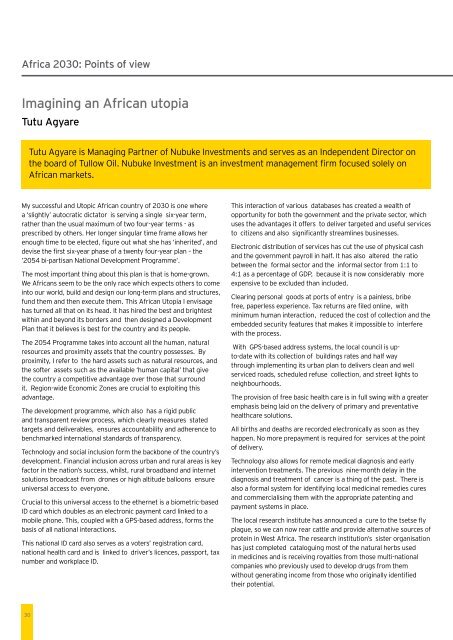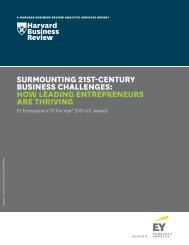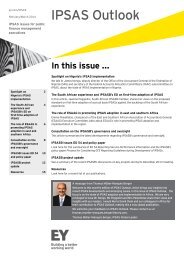Create successful ePaper yourself
Turn your PDF publications into a flip-book with our unique Google optimized e-Paper software.
Africa 2030: Points of viewImagining an African utopiaTutu AgyareTutu Agyare is Managing Partner of Nubuke Investments and serves as an Independent Director onthe board of Tullow Oil. Nubuke Investment is an investment management firm focused solely onAfrican markets.My successful and Utopic African country of 2030 is one wherea ‘slightly’ autocratic dictator is serving a single six-year term,rather than the usual maximum of two four-year terms - asprescribed by others. Her longer singular time frame allows herenough time to be elected, figure out what she has ‘inherited’, anddevise the first six-year phase of a twenty four-year plan – the’2054 bi-partisan National Development Programme’.The most important thing about this plan is that is home-grown.We Africans seem to be the only race which expects others to comeinto our world, build and design our long-term plans and structures,fund them and then execute them. This African Utopia I envisagehas turned all that on its head. It has hired the best and brightestwithin and beyond its borders and then designed a DevelopmentPlan that it believes is best for the country and its people.The 2054 Programme takes into account all the human, naturalresources and proximity assets that the country possesses. Byproximity, I refer to the hard assets such as natural resources, andthe softer assets such as the available ‘human capital’ that givethe country a competitive advantage over those that surroundit. Region-wide Economic Zones are crucial to exploiting thisadvantage.The development programme, which also has a rigid publicand transparent review process, which clearly measures statedtargets and deliverables, ensures accountability and adherence tobenchmarked international standards of transparency.Technology and social inclusion form the backbone of the country’sdevelopment. Financial inclusion across urban and rural areas is keyfactor in the nation’s success, whilst, rural broadband and internetsolutions broadcast from drones or high altitude balloons ensureuniversal access to everyone.Crucial to this universal access to the ethernet is a biometric-basedID card which doubles as an electronic payment card linked to amobile phone. This, coupled with a GPS-based address, forms thebasis of all national interactions.This national ID card also serves as a voters’ registration card,national health card and is linked to driver’s licences, passport, taxnumber and workplace ID.This interaction of various databases has created a wealth ofopportunity for both the government and the private sector, whichuses the advantages it offers to deliver targeted and useful servicesto citizens and also significantly streamlines businesses.Electronic distribution of services has cut the use of physical cashand the government payroll in half. It has also altered the ratiobetween the formal sector and the informal sector from 1:1 to4:1 as a percentage of GDP, because it is now considerably moreexpensive to be excluded than included.Clearing personal goods at ports of entry is a painless, bribefree, paperless experience. Tax returns are filed online, withminimum human interaction, reduced the cost of collection and theembedded security features that makes it impossible to interferewith the process.With GPS-based address systems, the local council is upto-datewith its collection of buildings rates and half waythrough implementing its urban plan to delivers clean and wellserviced roads, scheduled refuse collection, and street lights toneighbourhoods.The provision of free basic health care is in full swing with a greateremphasis being laid on the delivery of primary and preventativehealthcare solutions.All births and deaths are recorded electronically as soon as theyhappen. No more prepayment is required for services at the pointof delivery.Technology also allows for remote medical diagnosis and earlyintervention treatments. The previous nine-month delay in thediagnosis and treatment of cancer is a thing of the past. There isalso a formal system for identifying local medicinal remedies curesand commercialising them with the appropriate patenting andpayment systems in place.The local research institute has announced a cure to the tsetse flyplague, so we can now rear cattle and provide alternative sources ofprotein in West Africa. The research institution’s sister organisationhas just completed cataloguing most of the natural herbs usedin medicines and is receiving royalties from those multi-nationalcompanies who previously used to develop drugs from themwithout generating income from those who originally identifiedtheir potential.30





